Tim Worthington is a writer and podcaster responsible for a wide-ranging contribution to our appreciation of pop culture. A part of the “shadowy cabal” behind TV Cream he did much to bring an accessible and amusing overview of the lost world of British television to droves of early web users eager to see if anyone else remembered that kids’ show made of cotton reels, or if they had hallucinated Mollie Sugden in space. He has written books on radio comedy, Creation Records’ four key albums of 1991 and discography of BBC Record’s singles called Top Of The Box. A prolific contributor to fanzines, magazines, sleeve notes and his own blog, he has also published collections of his diverse writing. Looks Unfamiliar invites guests to talk about the things that they remember, but which no one else ever seems to, although Tim’s encyclopedic memory of such ephemera ensures that there is usually one other person who does! Previous contributors include Samira Ahmed and Mitch Benn. Meanwhile, on ‘It’s Good Except It Sucks’ he is on a hurtle through the Marvel Cinematic Universe aided and abetted by super-powered guests. Both can be found where you normally get your podcasts from. A life-long sci-fi fan, he regularly contributes to Doctor Who Magazine, where he has written about the Who-related BBC Records. Tim is also the inveterate tweeter @outonbluesix, an occasional broadcaster and is officially* TV’s Clanger’s expert. Phew! And I didn’t even mention his expertise on video nasties, love for David Bowie or erm, Ski Boy.
*You’ll have to read Can’t Help Thinking About Me to find out how that came about!

On the occasion of the publishing of Top Of The Box Volume 2 – a complete review of every BBC Records & Tapes album, and more – I sent Tim some questions to which he graciously provided the answers below. I should also mention here that I was very happy to be able to assist Tim in the editing of this book and provide some background research (i.e. this website and blog).
Tim’s deep knowledge of pop culture is a constant source of amazement to me and it’s a great pleasure and honour to be able to gain a deeper insight into how he approached this book and the serious way he grapples with his subject. Of course, I mean serious in the sense of treating it with respect whilst still laughing at the ridiculous and funny – both intentional and unintentional.

How many records are there in Top Of The Box Vol. 2 and how long did it take you to write something about all of them?
I haven’t dared to actually count them but I would say there were over eight hundred in total, including the ‘extras’ and the handful of unreleased albums that I’ve identified. Which is… staggering now that I think about it. One of my original inspirations for the first volume of Top Of The Box was the features that you used to get in Record Collector where a genre expert would write a complete discography of, say, the prog-rock label Vertigo, and suddenly find themselves having to randomly write about something like an Ike And Tina Turner album that they clearly knew nothing about at all, so you’d get this unintentionally amusing entry in amongst all the enjoyably informative know-all reverence where they had clearly at least liked this album that they’d bought for the sake of completion, but struggled to articulate this in any way that related to anything they knew or understood. So that was always what I modelled both books on, but this time around that was even more close to my own experience, and there were more than a handful of albums where I genuinely found myself thinking “what actually IS this?”. I still don’t really know in a couple of cases. Strangely enough, though, those albums were by far the most easy to write about. The ones that I both like as albums and know a good deal about, for example, BBC Radiophonic Workshop – 21 and The Rutland Weekend Songbook – felt weirdly daunting and I left a lot of them until towards the end as every time I tried to write something about them, I found myself struggling. Then again I always say it’s easier to write about the bad Rolling Stones albums than the good ones!
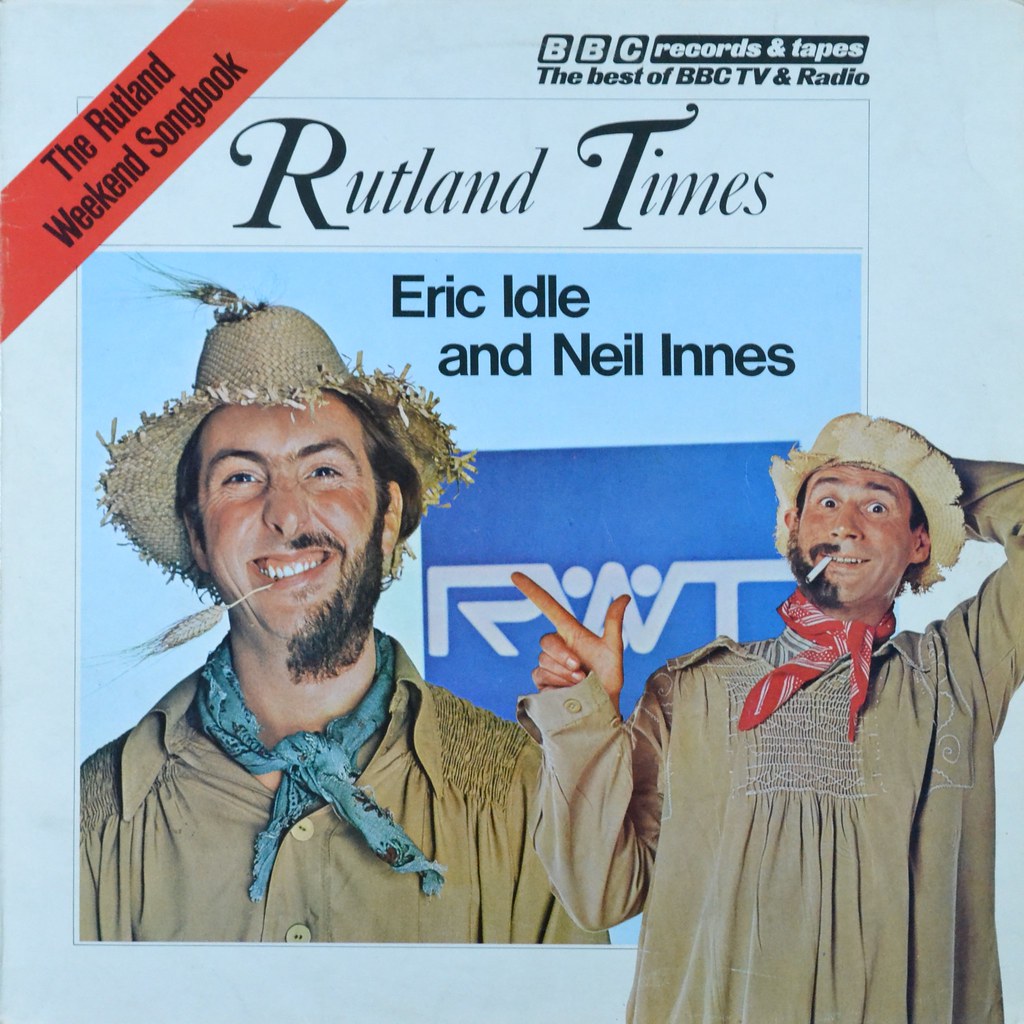
I guess that you haven’t listened to every minute of all these albums. Am I impugning your dedication to the task, or did you just not have access to them all? Maybe it wasn’t the point?
I tried as far as was possible to listen to at least a couple of representative tracks from everything – so in some cases that meant a couple of sound effects – and to be honest I took full advantage of the fact that it’s very easy to track down other collectors who have albums you either can’t find or don’t especially want to find and arrange for them to send you electronic files of them within a matter of minutes. In fact, I managed to get hold of one elusive album – albeit virtually – when I heard a BBC 6Music presenter play something from it and emailed them to plead for a copy. This is how I’ve been able to express something approaching an opinion on records like the Jan Rosol album, which are frankly like gold dust of gold dust – usually because they sold very few copies and nobody much cares rather than because they’re especially highly sought after – but there’s almost always someone who has a copy, usually one that they almost literally pulled out of a bin and thought no more about. I’ll be honest though and say that there are more than a few albums where if you’ve heard one track, you’ve pretty much heard them all. This is especially true of the big band ones – if their versions of songs that you’ve heard of aren’t very good, and nobody else is bigging up a hidden classic anywhere, then the rest of it is invariably not worth investigating!
How did writing this one compare to Top Of The Box, your similar compendium of BBC singles?
It was a good deal more of a daunting prospect – in fact, I had originally insisted I wouldn’t do it – and there were moments when I just couldn’t see the point of it at all, especially while detailing all of the Silver Jubilee tie-ins and the ‘Weekend Sounds’ reissues. As much as I might admire The Goons, chronicling all of the Goon Show Classics releases became a bit tedious too. What more is there to say about them after the first one? The key to getting through it though was to try and find the humour in everything. Once you’ve latched on to something like the lazy re-release covers of for example Parkinson Meets The Goons – what’s going on there… have they murdered him?? – or the weird inconsistencies in the birdsong tracklistings, it’s that bit easier if there’s a joke waiting for you at the end. Where it was actually more fun and interesting, however, was in looking at the Study Series and Roundabout imprints in particular. There’s a whole lost world of broadcasting in both of those and in fact, I was at one point tempted to release some kind of expanded version the Study Series section as a standalone mini-book instead. On reflection, I’m glad I resisted that temptation though.
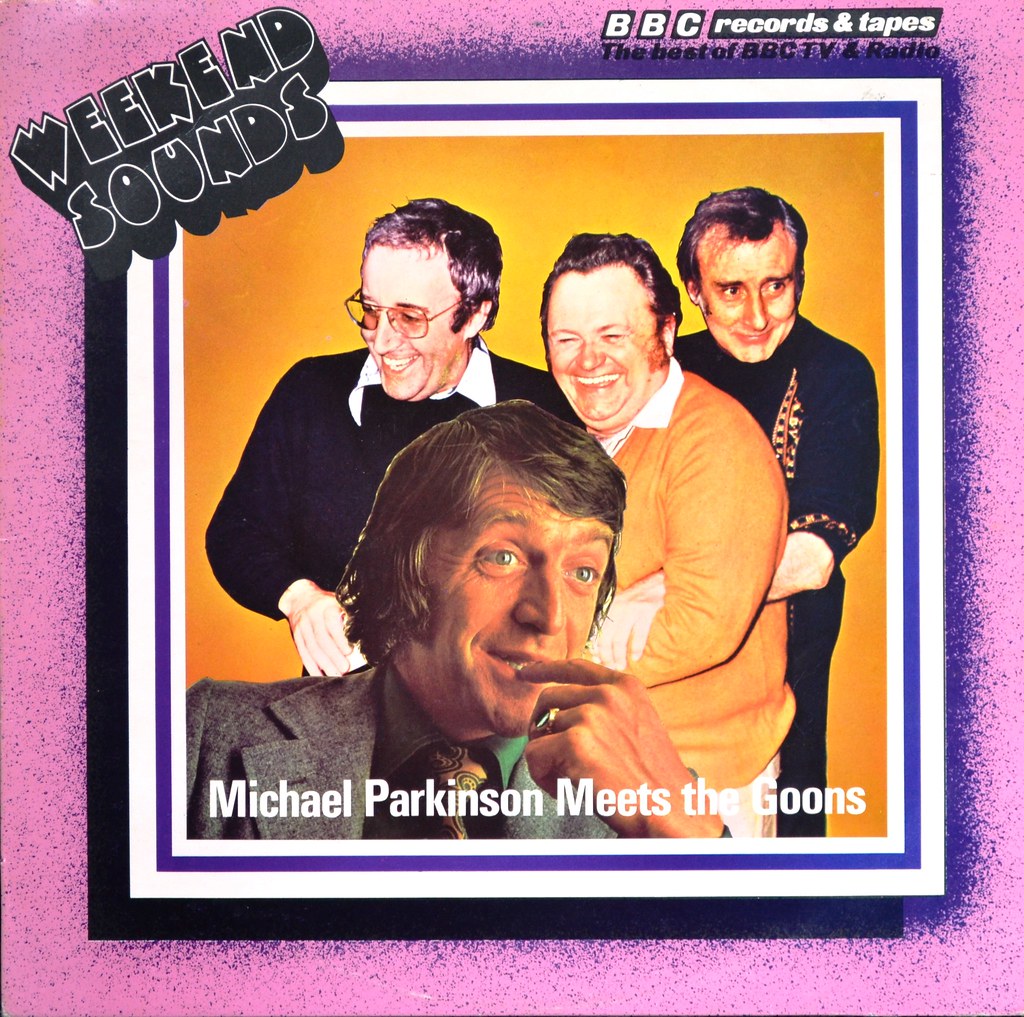
What was your first BBC record or tape? Did you have any around the house growing up?
We definitely had Bang On A Drum – Songs From Play School And Play Away – I remember finding the ‘and last thing at night!’ on Brush Brush Brush very annoying indeed – but I’ve no idea what happened to that particular copy. We did have a lot of children’s albums – usually with a bargain bin sticker on – including things like the P.G. Tips ‘Mr. Shifter And The Removal Men’ album and a story record of Sally And Jake, which was an ITV children’s series, so I wouldn’t be surprised if there were a couple of others in there too. I also had Genesis Of The Daleks, obviously, and got Sci-Fi Sound Effects on cassette as a souvenir of a visit to the Doctor Who Exhibition at Longleat. The first one that I remember specifically asking for was the theme single from The Tripods, and the first one that I bought myself was Something Outa Nothing by Letitia Dean And Paul J. Medford, which I got because I liked the song, and I liked the EastEnders storyline about them forming a band, and I, erm, liked Letitia Dean. I shall say no more about that. Both of those were because I liked the show and the music rather than anything to do with the label itself, though.
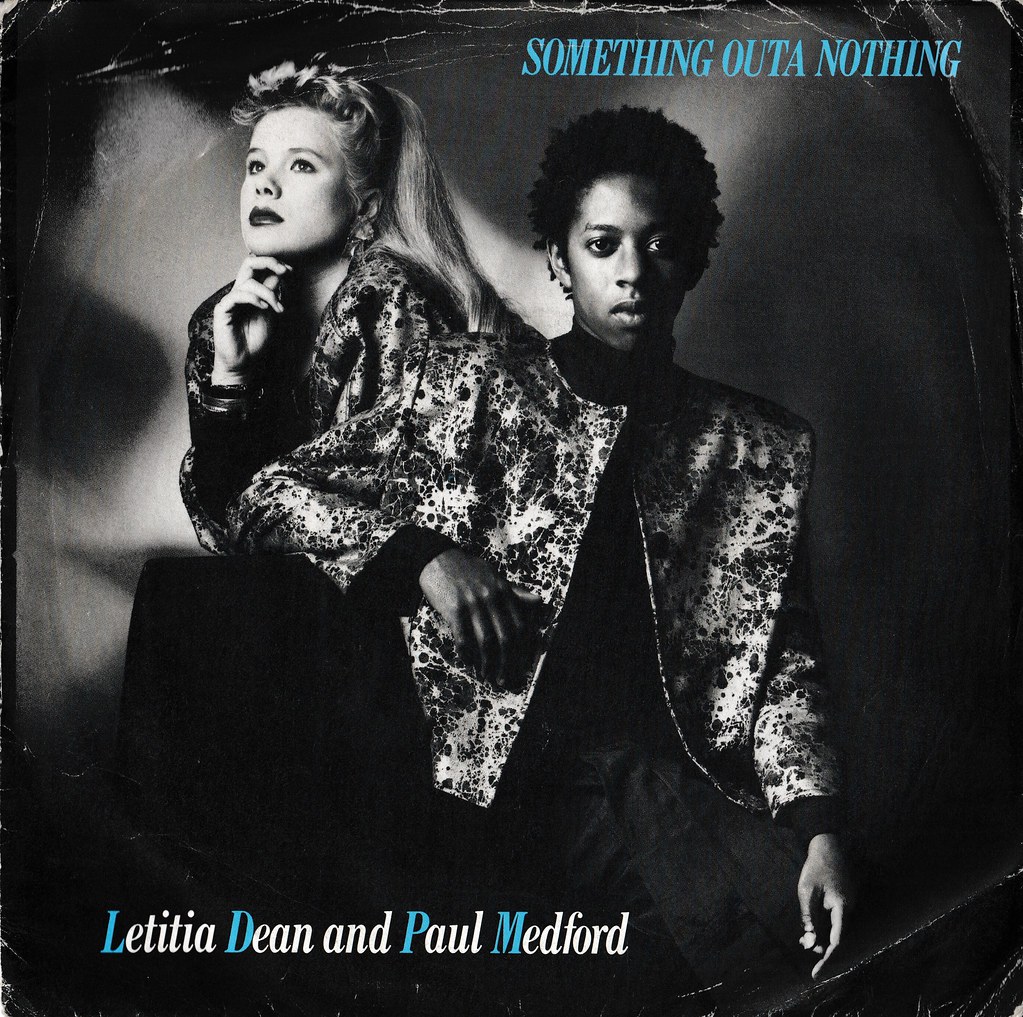
Were you ever buying them new or was it always matter if unearthing things second-hand?
There were definitely some that I bought as new releases, including The Best Of BBC TV’s Themes and The World Of BBC TV Themes as they were heavily advertised after some of the programmes featured on them, BBC Sporting Themes (the late eighties version) as it was a cheaper way of getting hold of Soul Limbo than buying the only expensive import Booker T. & The MG’s compilation that they had in Our Price (though I doubt that had as much tape hiss on it!), and a couple of others like BBC Space Themes and Through A Glass Darkly which had been deleted but which you could still pick up in sci-fi bookshops and the like for ages afterwards. This was towards the end of the range though and again I wasn’t collecting them because of the label, just because of what was on them really, so it was mainly second hand.
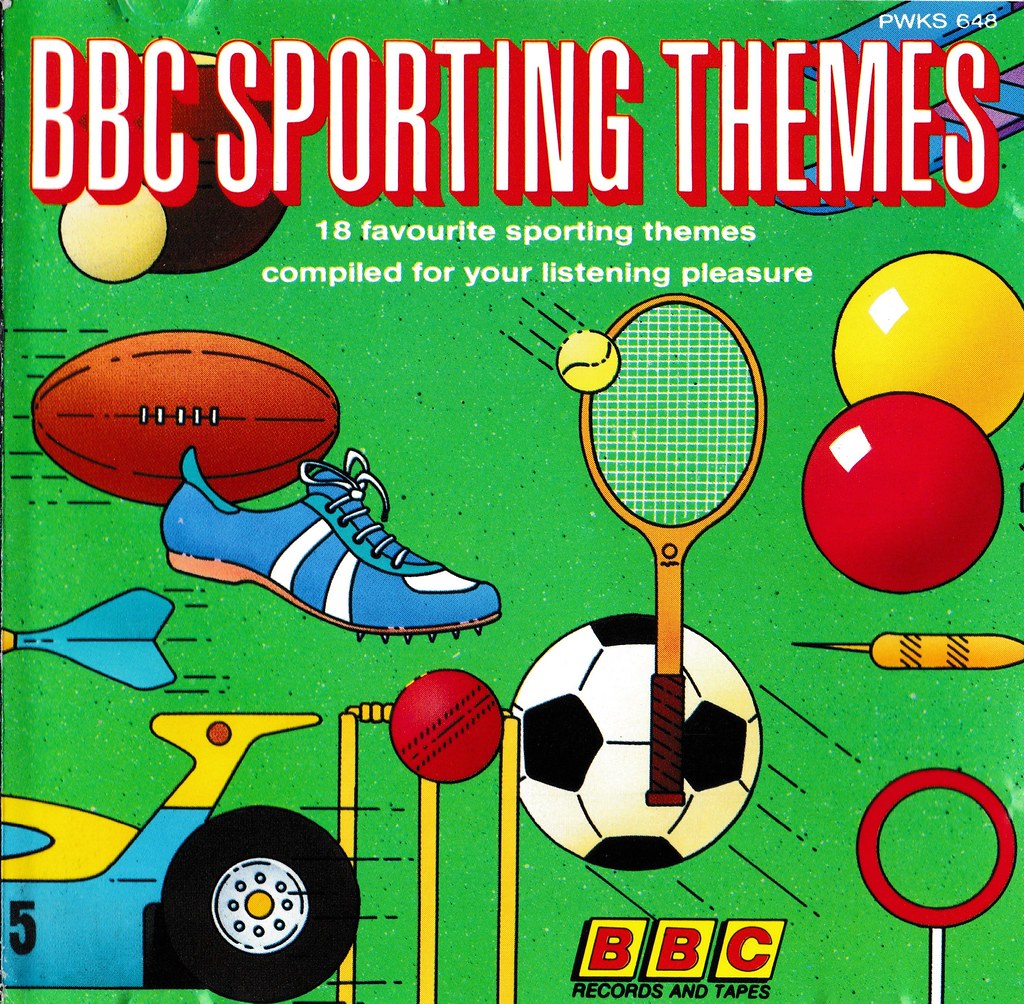
I’ve heard you say you started digging and turning up BBC records more in the mid-nineties lounge-core era when you were DJing regularly. Were you dropping Easy Listening BBC deep cuts into your sets? Was it a more general interest in the era that drew you in too?
Yes, that was exactly it – that’s when my love of soundtracks in the, for want of a better term, pre-Star Wars sense really kicked in, and in those days you could walk into any old charity shop and find the Camberwick Green album, Dungeon Folk, Show Of The Week and Bobby Lamb And The Keymen and still have change from fifty pence. It was a real combination of curiosity and nostalgia – this stuff wasn’t even that old but it already felt like a lost world in a way that I’m not sure anything really can now. Not all of the albums were wall-to-wall showstoppers but slowly tracks like Standing On One Leg and Silence Is Requested In The Ultimate Abyss that deserved a wider audience started to emerge and that’s when it really became obvious that there were a lot of undiscovered moments of eccentric genius to be found on these records. The odd thing was that as the whole ‘Britpop’ scene got bigger, people got less open-minded about the sort of music that had initially inspired it – I’m not even going to blame Noel Gallagher for that as I would normally do, as he was actually going on about Burt Bacharach and The Left Banke and so on, it’s just the public who weren’t interested – and so all of this stuff that really had influenced the whole scene because people like Andy Lewis were playing it in the London lounge/indie clubs just dropped off the radar. I definitely remember trying to ‘break’ things like Jerome from the Ragtime album and just ending up clearing the floor, but then that was true of a lot of things that I thought might take off because it was a bit like what was in the charts. Altered Images and Orange Juice, for example, or Syd Barrett-era Pink Floyd – oddly – and anything Glam Rock related was an absolute non-starter for some reason. The theme from Quiller by Richard Denton and Martin Cook always had people coming up asking what it was though!
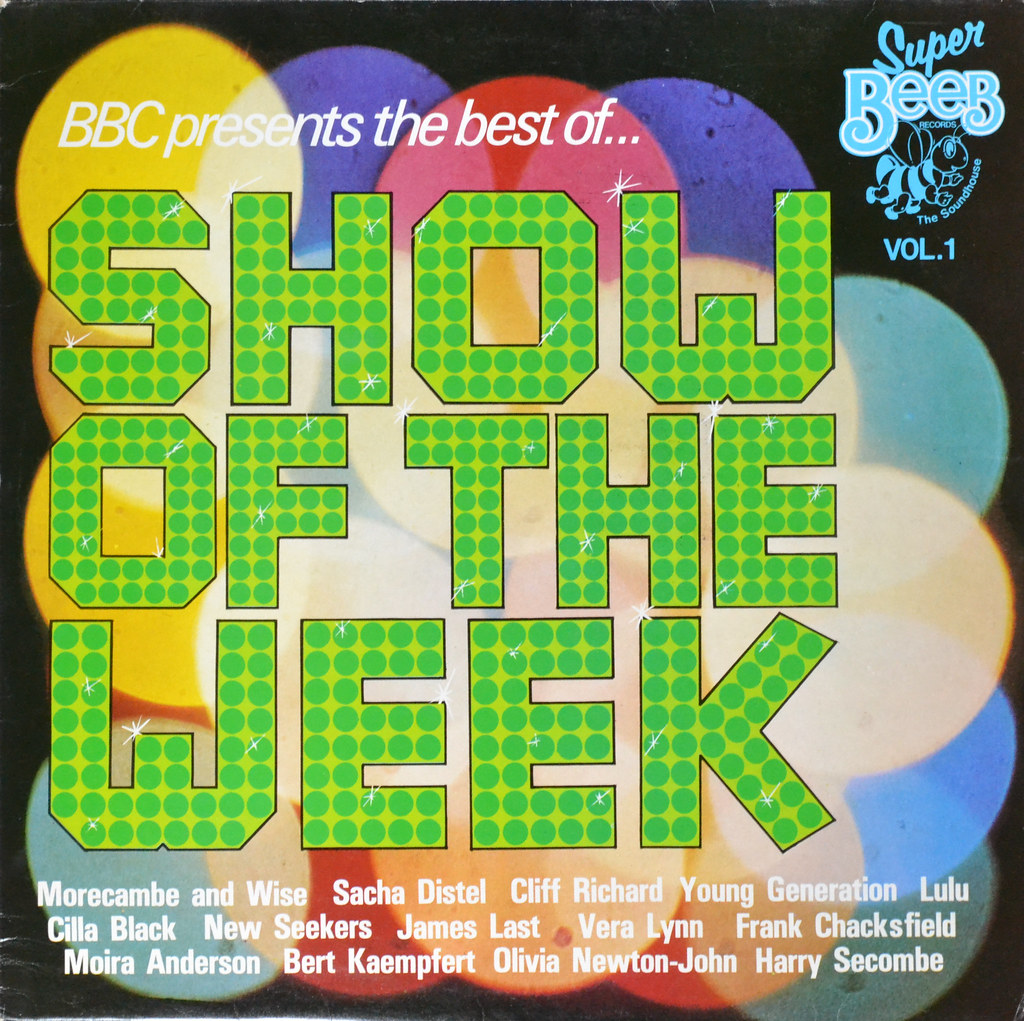
When did you start wondering how big the catalogue was and how did you begin collating this list of releases?
Top Of The Box ultimately has its roots in a daily trivia blog that I ran with my longtime collaborator Ben Baker; we were trying to hook people in with the promise of a couple of facts about a different subject every day but it was way before social media really existed and we just couldn’t get anyone interested. Now you’ll see accounts doing much the same thing getting thousands of retweets every three minutes. Massive overambition on our part really because the appropriate tools for this sort of thing just didn’t exist yet but I’m still very proud of what we did in the six months or so it was around for. Anyway, one day I did something about BBC Records And Tapes theme singles, then later we collated some of the best material in a book so that we could at least get something out of it – I think you can still get that from Ben’s website incidentally – and I expanded it for that into a list of some of the oddest releases from the label. It pretty much carried on expanding from there really. A lot of the credit for these books existing in the first place should go to Ben really, as he always believed it was an idea worth pursuing even when I had some fairly major doubts. Also, that original list just underlines the best thing about BBC Records And Tapes – the more you look into their catalogue, the stranger it gets. The one thing you could never accuse it of being is boring. Although who needed so many Band Of HM Guards albums and why is another question.
Are there any BBC records and/or tapes you still don’t have but would love to turn up in your local charity shop?
I’d love to find an original copy of The Seasons – I doubt many copies were ever actually pressed and the ‘hauntology’ mob have pushed the asking price of the few that are out there up massively. It’s a similar story of the album of the original version of Look And Read: The Boy From Space. In fact it’s mainly the Study Series ones that are spectacularly massively difficult to find, at least out of the ones I’m interested in. I’d also love to get hold of David Cain and David Munrow’s collection of music from radio plays, which I only ever had a tape copy of a tape copy of. It would be nice to stumble across something bland but incredibly rare like Pianorama just for the fun of it though. Most of the others it’s actually quite easy to find if you’re patient,. Even things like Disc A Dawn sometimes sneak through for a couple of quid on eBay if nobody else spots them.
You don’t strike me as an obsessively completist collector, but do you have any ambitions to own any kind of set or series of BBC Records?
Not as such, but I’d like to see more reissues on a ‘theme’. Mark Ayres’ box set of the BBC Radiophonic Workshop albums with bonus tracks and sleevenotes has shown what can be done and how you can make a ‘story’ out of a linked set of albums that most people have probably never given a second thought to. Imagine if someone did the same with the Play School and Play Away albums, or the Acid Folk stuff like Folk On Friday, Dungeon Folk and that Welsh one I’m not going to embarrass myself by trying to spell (Cymanfa Ganu – Welsh Ed.). There’s definitely something to be gained from taking these albums out of their context – or lack of one really – and putting them into a new one. So many more listeners would suddenly pay attention.
The designs used by the company changed over the years. Which is the best label design and why?
Although it doesn’t quite match the version seen on screen, I would have to say the one that mirrored the BBC’s ‘slanted blocks’ logo. That logo will always ‘be’ the BBC for me, and I have very fond memories of seeing it pop up at the end of shows like Mary, Mungo And Midge and Mr. Benn. So for culturally aesthetic rather than design-related reasons – which kind of echoes my approach to the book really.

Which records have the best and which the worst sleeve designs? (I know you will interpret best and worst however you want)
The best ones to me are the ones from the early seventies when they had just phased out the generic sleeves but had no real visual reference materials to hand so had to create their own using elements presumably borrowed from the production office. So you end up with images like the Play School toys all battering a drumkit, or that deeply acid-frazzled still from the Disc A Dawn opening titles, which at the time presumably represented little more than ‘you recognise this’ but now stand as having accidentally captured a sort of pop culture design aesthetic that’s since been lost to time. As for the worst, there are plenty of dreadful sleeve images, including all those Hoots! It’s A Braw Scottish Jingsfest! efforts with a thistle on top of some bagpipes and that George Gershwin one where someone has tried to make him out of a Cadbury’s Caramel, but the ‘best’ worst for me are the procession of illustrated covers for the Hancock’s Half Hour releases where he appears to be gradually melting across each one.
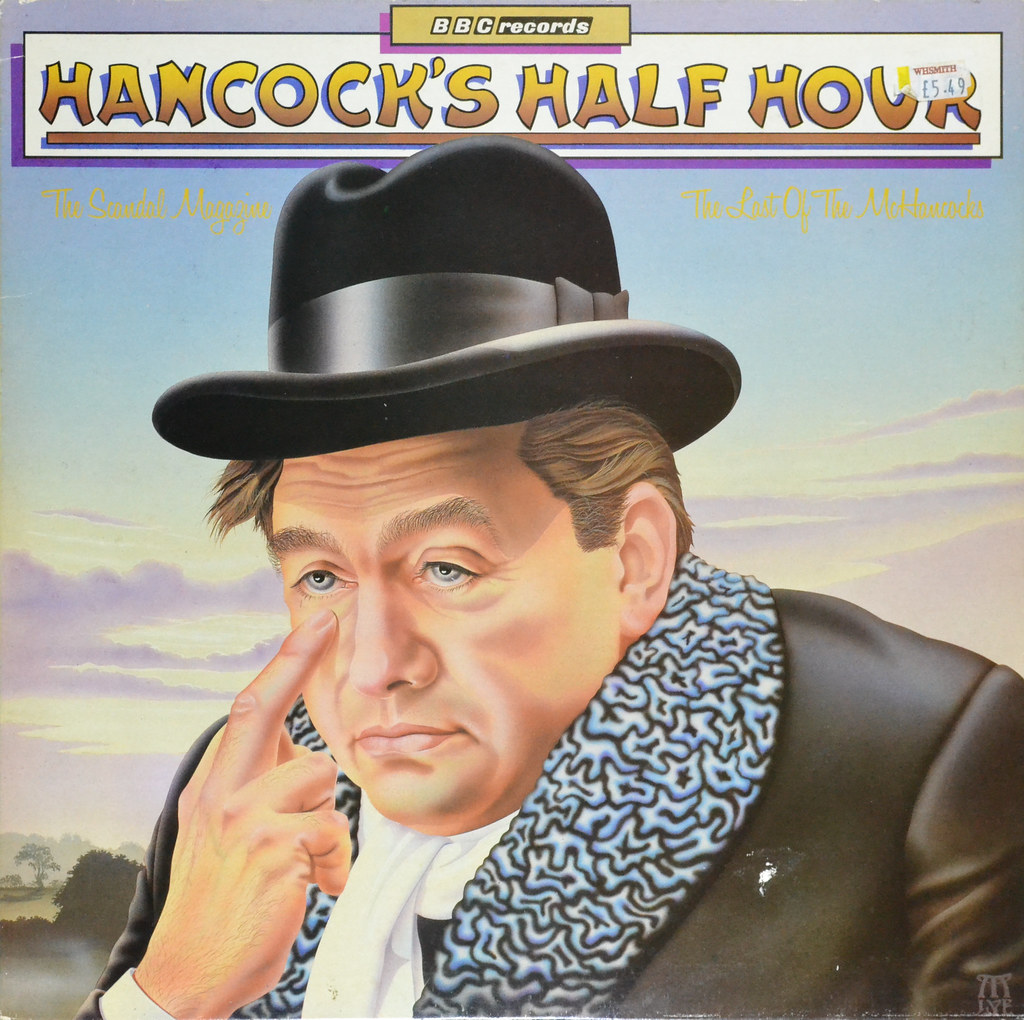
In the book you occasionally say how a particular record is more entertaining than one might think. Was this something you knew and wanted to explain going into the project? Or was it revealed during your research?
It’s always something that you hope you’ll find out, and it’s even more pleasing when it involves something that you weren’t expecting, like for example the album by Grace Kennedy, who to me at that age was just someone who came on and did boring singing when the sitcoms had finished, or the Bertha album, which was based on a children’s show I barely saw due to being way too old by that point. Given that I had originally developed an interest in BBC Records And Tapes through standout tracks on unlikely albums, this was always at the forefront of my thoughts and my main aim was really to discuss these records in terms of their entertainment value – which, of course, was the only reason that they ever existed in the first place – rather than at best some sort of box-ticking exercise and at worst some kind of little world where only the ‘enlightened’ few are both in charge and allowed access. If you’re looking to me to lead a march on ITV demanding the cancellation of The Masked Singer while waving a copy of At The Cinema Organ Volume 2 then I’m afraid you’ll have to look elsewhere. In fact, I’d probably buy an album of The Masked Singer if there was one.
I find listening to the records whose subject matter is of little to no interest to me still throw up fascinating or just quirky nuggets. What interesting knowledge have you learned from BBC Records & Tapes?
Quite a lot, actually. I always wanted to know the background behind the shows and the people involved in them, and it’s always fascinating to find out about these individuals and programmes that meant something in their time but just haven’t imprinted themselves on the popular memory – and that can be for any number of reasons. The early releases, in particular, seemed to lead off in all manner of fascinating directions, whether it was presenters who were actually the first to certain kinds of broadcast but are never really credited for that or schools programmes that once went on-air day in day out – well, schoolday in schoolday out – but are now nothing more than perfunctory titles. More or less anything interesting I found out that actually was interesting found its way into the book, although sometimes that can be a difficult distinction to draw. At the end of the day, if you’re trying to tell a ‘story’ over and above a straightforward reference work, some facts will fit that and some won’t!
After reviewing dozens of bird song LPs, can you now identify every native bird in Britain?
Only those from Sewage Farms, Gravel Pits and Waste Ground.
You have had the experience of writing about or around the dark passages of the BBCs history before, particularly in your book about Radio 1s comedy shows – Fun At One. How do approach that and how challenging was this book specifically?
Fun At One was different in the sense that at that stage, nothing had come out about any of these people. There were of course rumours, and a couple of people that I interviewed tried to drop some hints that there were names that I ought to avoid – without actually specifying any details – but thankfully they were all as good as incidental to the narrative anyway, and one major part of the book involved a comedian who had taken a dislike to a certain Boris Johnson lookalike which culminated in them humiliating him on air. Actually, that happened twice, so that was a real stroke of good fortune. Fun At One coming out coincided exactly with that story breaking and it did suffer a bit as a consequence, but as I was hardly exactly the victim there I’ve never really felt resentful about that. This time around, however, I knew these people would be coming up over literally a handful of albums so my only thought was to acknowledge the fact that they were on there – there’s a sense in which pretending they didn’t exist sort of echoes how they got away with all of it in the first place so I did not want to do that – then give a perfunctory description, mention their present-day reputation and move on. A couple of useful details did come to light, though – notably, the producer of Radio 1’s Speak Easy, who also produced a couple of albums for the label, had given an interview in which he discussed the fact that he had always had some suspicions about Savile but had failed to act on them, while there’s also the case of Angels And 15 Other Original BBC-TV Themes, which once used to change hands for about fifty to sixty quid but now can be picked up for next to nothing, and I don’t think the presence of a certain theme on there is entirely a coincidence. The important thing is to try and make something positive out of the damage that they have done, though, and one thing that really struck me while putting the book together was how certain people that we were once encouraged to think of as the ‘enemy’ just because people found them annoying – Derek Jameson, Paul Daniels, Andrew Lloyd-Webber and so on – actually weren’t really the bad guys after all. You may have disagreed with them on some issues, but they weren’t really causing any active harm – well, I could quibble about the voting record of one of the above but that’s a different argument – and I tried to reflect that here as best I could. You might as well give them the relative credit that they deserve.
Sell through video killed off the tie-in comedy LP: discuss with reference to what we might have had and the lost opportunities.
I’m not sure it did, to be honest – with the best will in the world towards them, I think it was the early Comic Relief singles. You got a credible comedy song on one side, and a lengthy comedy sketch on the other; the comedians got to play out their popstar fantasies, much-needed money went to charity and the punters had about as much as they were prepared to take of a joke that would have fallen flat over the length of an album anyway. If you look at what else was going on even long before Newman and Baddiel (who did at least have a bash at an album with Minutes Of The Parish Council Meeting) started selling millions of videos, it was all getting a bit song-based anyway – Neil’s Heavy Concept Album, the unreleased Raw Sex album (which I would love to hear if anyone out there can help), I Will Cure You, Bad News… I’m fairly certain that even if The Young Ones or Red Dwarf had been let loose in a studio for a full day, they’d have just come out with jokey covers of Saving All My Love For You or something.
Desert Island Discs. We’ll give you copies of The Complete Monty Python’s Flying Circus All The Words and The BBC Genome database, of course, but what 8 records from the BBC Records & Tapes catalogue would you take with you?
It would have to be albums that you wouldn’t get bored of, so for various reasons – Camberwick Green, Sci-Fi Sound Effects, Through A Glass Darkly, Bang On A Drum, Magic Roundabout, Hoffnung, Hedgehog Sandwich and Genesis Of The Daleks. I’ll leave the readers to figure out why in each case.

Two books on the BBC’s records now, Tim, singles and albums. Is that it? Could you bring yourself to cover hundreds of BBC Radio Collection cassettes or Radio Play LPs? Some other label, perhaps? Or are you done with this kind of epic discography?
It’s probably time to try something else less ambitious and more out and out fun, but that said I really am fascinated by the early days of BBC Video – or the ‘Video Tasties’ as they called them in that brilliantly ludicrous advert with Tom Baker – so there could be something in that.
You’ve written a number of books over the years – Higher Than The Sun being a favourite of mine – but this one seems to have held the production line up a little. Can we expect more soon? Any hints as to what you have coming next?
Another anthology, definitely, but it’s funny you should mention Higher Than The Sun because I want to do something a little different to what I’m ‘known’ for again, and in fact, I do have an idea that is some way along already. I’m not going to say ‘watch this space’, but it might be an idea to keep an eye on… the galaxy?
Ah, what could that be? I’ll leave you to guess whilst I thank Tim for his answers and remind you that both volumes of Top Of The Box are available through his website timworthington.org where you can also find his other books, the podcasts, blog posts aplenty and more!
Footnotes
- Do check out the wonderful, hilarious world of Ben Baker’s writing and podcasting too linktr.ee/BenBakerBooks.
- Whilst checking than Jan Rosol album during the editing of this post I spotted that there was one for sale on Discogs for £2.50! I obviously bought it on the spot!
- Cymanfa Ganu was misspelled on this very website till I went to check and is spelled CYMANSA GANN on the official charts website.
- BBC Wildlife Series no.9 – Back garden birds (and other creatures of British towns and surrounding areas) (RED 109, 1971) is where you’ll find a section on ‘Sewage Farms, Waste Ground & Gravel Pits’. Be sure to test Tim on the Redshank if you run into him!
